 W
WAdam Georg von Agthe was a major general in the Imperial Russian Army during the Napoleonic Wars. He was also known by his Russian name Egor Andreevich Akhte.
 W
WBaron Karl Vasilievich Ludwig von Budberg was an Imperial Russian cavalry general and nobleman who participated in the Napoleonic Wars.
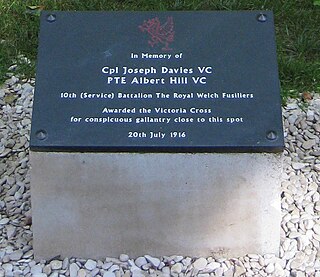 W
WJoseph John Davies was a British recipient of the Victoria Cross, the highest and most prestigious award for gallantry in the face of the enemy that can be awarded to British and Commonwealth forces.
 W
WWilhelm Caspar Ferdinand Freiherr von Dörnberg was a German general. He was also known as 'Aufstandsdörnberg' or 'Uprising Dörnberg', for his part in the German campaign of the Napoleonic Wars. He also fought as a brigade commander at Quatre Bras and Waterloo.
 W
WYermolay Yermolaevich Gamper was a Russian major general who fought in the Russo-Turkish Wars and Napoleonic Wars.
 W
WFyodor Grigorevich Gogel was a lieutenant-general of the Russian Empire, principally known for his service during the Napoleonic Wars.
 W
WIvan Sergeyevich Leontiev was an Imperial Russian general who fought in the Napoleonic Wars. In December 1812 he was promoted to Major General and made commander of the 1st Brigade of the 2nd Cuirassier Division under Baron Duka and fought at the battles of Lützen and Bautzen.
 W
WOskars Kalpaks was the commander of 1st Latvian Independent Battalion, also known as "Kalpaks Battalion".
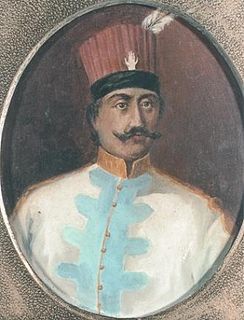 W
WLambros Katsonis was a Greek revolutionary hero of the 18th century; he was also a knight of the Russian Empire and an officer with the rank of colonel in the Imperial Russian Army, decorated with an Order of St. George, IV class medal.
 W
WPolkovnik Ivan Alexandrovich Loiko was a World War I flying ace credited with six confirmed aerial victories by the scanty and confusing records still existent. He rose to command a fighter unit, the 9th Fighter Aviation Detachment. After serving his czar faithfully until the October Revolution, in December 1918 Loiko joined the White Russian movement to reinstate his sovereign. When they were defeated by the Bolsheviks, Loiko turned to service in the Kingdom of Yugoslavia's air force in 1921. Two years later, he defected back to Russia in a Yugoslavian Breguet 19. From 1924-1929, Loiko served in the Red Army Air Force. In 1929, he was convicted of espionage on behalf of Romania and sentenced to ten years imprisonment. He served five years on Vaygach Island, and remained there after his release from captivity. He is believed to have committed suicide in April 1936.
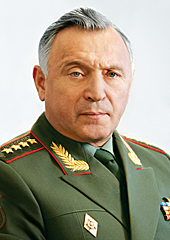 W
WArmy General Nikolai Yegorovich Makarov served as Chief of the General Staff of the Armed Forces of Russia and First Deputy Minister of Defence from 2007 to 2012, when he was replaced by Valery Gerasimov.
 W
WMaksud Alikhanov-Avarsky (1846-1907) - Russian Lieutenant-General, Merv District Head and Tiflis Governor. The elder brother of Kaitmaz Alikhanov.
 W
WBolesław Euzebiusz Mościcki was a Colonel of both the Imperial Russian Army and Polish Army. Born in Wysokie Mazowieckie, in the Łomża Governorate of Congress Poland, Moscicki served during World War I in the 1st Uhlan Regiment of the Pulawy Legion. He died on February 18, 1918 near Luninets.
 W
WMykhailo Omelianovych-Pavlenko was the Supreme Commander of the Ukrainian Galician Army (UHA) and of the Army of the Ukrainian People's Republic. Later, he served as Defence Minister for the Government-in-exile of the Ukrainian People's Republic.
 W
WPrince Alexey Fyodorovich Orlov was a Russian diplomat, the natural son of Count Fyodor Grigoryevich Orlov. He was born in Moscow and took part in all the Napoleonic Wars from 1805 to the capture of Paris. For his services as commander of the cavalry regiment of the Horse Life Guards on the occasion of the rebellion of 1825 he was granted a title of count, and in the Turkish War of 1828–1829 rose to the rank of lieutenant-general.
 W
WGherman V. Pântea was a Bessarabian-born soldier, civil servant and political figure, active in the Russian Empire and Romania. As an officer of the Imperial Russian Army during most of World War I, he helped organize the committees of Bessarabian soldiers, oscillating between loyalty to the Russian Provisional Government and the cause of Bessarabian emancipation. Pântea was subsequently Military Director of the Moldavian Democratic Republic, answering to President Ion Inculeț. He personally created a Bessarabian defense force, tasked with combating Bolshevik subversion and Russian intimidation, but also braced for defeat after the October Revolution.
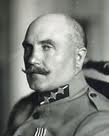 W
WMārtiņš Peniķis (1874–1964) was a Latvian general and commander in chief of Latvian Army from 1928 to 1934. He was awarded with Order of Lāčplēsis and Order of the Three stars.
 W
WPeter Alexandrovich Polovtsov, was a Russian Tsarist General.
 W
WAleksandr Puzyrevskii was a Russian General of the Infantry. Puzyrevskii distinguished himself in the Russo-Turkish War (1877–1878), subsequently becoming a professor at the General Staff Academy and Chief of Staff of the Warsaw Military District. In parallel he wrote articles on military history and led efforts in the improvement of education among Russian military officers.
 W
WBoris Aleksandrovich Shteifon was a general lieutenent in the Imperial Russian Army, who subsequently served as a general in the Russian anti-communist White army, and as the leader of the Nazi-allied Russian Corps in Serbia during World War II.
 W
WMovses Silikyan was an Armenian general and national hero of World War I. He served as a major general in the Russian Imperial Army before the Bolshevik Revolution.
 W
WNichita P. Smochină was a Transnistrian-born activist, scholar and political figure, especially noted for campaigning on behalf of ethnic Romanians in the Soviet Union. He was first active in the Russian Empire, serving with distinction in World War I, then in the Ukrainian People's Republic, where he earned his reputation as a champion of Transnistrian Romanian interests. An anti-communist, he narrowly escaped the Bolsheviks and crossed into Romania, which became his second home. A protégé of historian Nicolae Iorga, Smochină earned his academic credentials and also made himself known internationally as an expert on minority rights. Beginning in the 1920s, he contributed to historical research, ethnography and folkloristics, as well as jurisprudence.
 W
WAfrikan Aleksandrovich Spir (1837–1890) was a Russian neo-Kantian philosopher of German-Greek descent who wrote primarily in German. His book Denken und Wirklichkeit exerted a "lasting impact" on the writings of Friedrich Nietzsche.
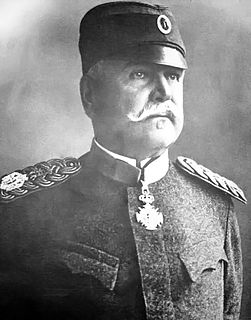 W
WField Marshal Stepan "Stepa" Stepanović was a Serbian military commander who fought in the Serbo-Turkish War, the Serbo-Bulgarian War, the First Balkan War, the Second Balkan War and World War I. Having joined the Serbian military in 1874, he fought against the forces of the Ottoman Empire in 1876. Over the following years, he climbed up the ranks of the Serbian Army and fought against Bulgarian forces in 1885. He eventually became the Serbian Minister of War in April 1908 and was responsible for instituting changes in the Serbian Army.
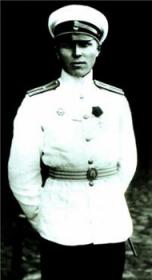 W
WViktor Viktorovich Utgoff was a Russian naval aviator who became a seaplane ace during World War I with five aerial victories, while serving in the Black Sea Fleet of the Imperial Russian Navy.
 W
WKapitan Vasili Ivanovich Yanchenko was a World War I flying ace credited with 16 aerial victories. He graduated his secondary education as a mechanical engineer in 1913, with an interest in aviation. He learned to fly shortly after graduation.